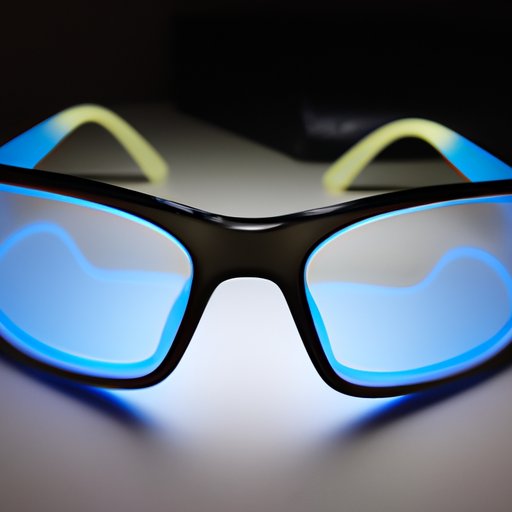Introduction
Blue light glasses have become increasingly popular over the past few years as people become more aware of the potential health risks associated with prolonged exposure to blue light. But what exactly are blue light glasses and are they really worth it? This article will explore the benefits and risks of using blue light glasses and provide an in-depth look at the science behind them.

Exploring the Benefits and Risks of Blue Light Glasses
Blue light is part of the visible light spectrum that we can see with our eyes. It has a short wavelength and high energy, which makes it more likely to cause damage to our eyes. Prolonged exposure to blue light can lead to digital eye strain, sleep disturbances, and even macular degeneration. Blue light glasses are designed to reduce the amount of blue light reaching your eyes, thus reducing the potential for harm.
The main benefit of wearing blue light glasses is that they can help protect your eyes from the damaging effects of blue light. They also help reduce digital eyestrain, which can occur from long hours spent staring at screens. Additionally, some studies have suggested that wearing blue light glasses can help improve sleep quality, as blue light can disrupt our natural circadian rhythms.
However, there are some potential risks associated with wearing blue light glasses. For one, they can be expensive, and not everyone may be able to afford a good quality pair. Additionally, blue light glasses may not be effective at completely blocking out all blue light, so you may still be exposed to some degree. Finally, some people may experience eye fatigue or headaches when wearing blue light glasses, so it’s important to take breaks if you start to feel any discomfort.
A Buyer’s Guide to Finding The Right Blue Light Glasses
When selecting a pair of blue light glasses, there are several things to consider. First, you’ll want to make sure that the lenses are rated to block out at least 90% of blue light. You should also look for glasses with anti-reflective coating, as this can help reduce glare and make your eyes more comfortable. Additionally, you’ll want to make sure that the glasses fit comfortably and don’t pinch or press too hard against your face.
There are several different types of blue light glasses on the market. Some are designed to be worn indoors, while others are made for outdoor use. Additionally, there are prescription blue light glasses available for those who need vision correction. Finally, there are blue light glasses specifically designed for children, which can help protect their developing eyes from blue light.
Examining the Pros and Cons of Blue Light Glasses
Now that we’ve explored the different types of blue light glasses on the market, let’s take a closer look at the pros and cons of using them. On the plus side, blue light glasses can help protect your eyes from the potentially damaging effects of blue light. They can also reduce digital eyestrain and may even improve your sleep quality. Additionally, many blue light glasses are stylish and can be a fashionable accessory.
On the downside, blue light glasses can be expensive, and they may not be effective at completely blocking out all blue light. Additionally, some people may experience eye fatigue or headaches when wearing blue light glasses. Finally, blue light glasses may not be suitable for everyone, so it’s important to consult with your doctor before using them.
An In-Depth Look at the Science Behind Blue Light Glasses
In order to understand the effectiveness of blue light glasses, it’s important to take a look at the science behind them. Blue light has been linked to a number of negative health effects, including digital eye strain, sleep disturbances, and even macular degeneration. While the exact mechanism of how blue light causes these effects is still unknown, it is believed to be related to the fact that blue light has a shorter wavelength and higher energy than other types of light.
While there is still much research to be done, some studies have suggested that wearing blue light glasses can help reduce the amount of blue light reaching your eyes, thus reducing the potential for harm. Additionally, some studies have shown that blue light glasses can help improve sleep quality by limiting the amount of blue light exposure at night.

Comparing Different Types of Blue Light Glasses on the Market
When selecting a pair of blue light glasses, it’s important to consider the different types of glasses available. Indoor glasses are designed to be worn indoors and can help reduce digital eye strain. Outdoor glasses are designed for outdoor use and can help protect your eyes from the sun’s UV rays. Prescription glasses are designed for those who need vision correction and can provide both protection from blue light and improved vision. Finally, children’s glasses are designed to protect their developing eyes from blue light.
Each type of blue light glasses has its own advantages and disadvantages. Indoor glasses are usually less expensive and can be more comfortable to wear for long periods of time. Outdoor glasses offer better protection from the sun’s UV rays but can be more expensive. Prescription glasses can provide both improved vision and protection from blue light, but they can be bulky and uncomfortable. Finally, children’s glasses are designed to be comfortable and protective, but they can be more expensive than adult glasses.
Conclusion
Blue light glasses have become increasingly popular in recent years as people become more aware of the potential health risks associated with prolonged exposure to blue light. While there are some potential benefits to using blue light glasses, there are also some potential risks. Ultimately, whether blue light glasses are worth it will depend on your individual needs and preferences. It’s important to do your research and consult with your doctor before making a decision.


